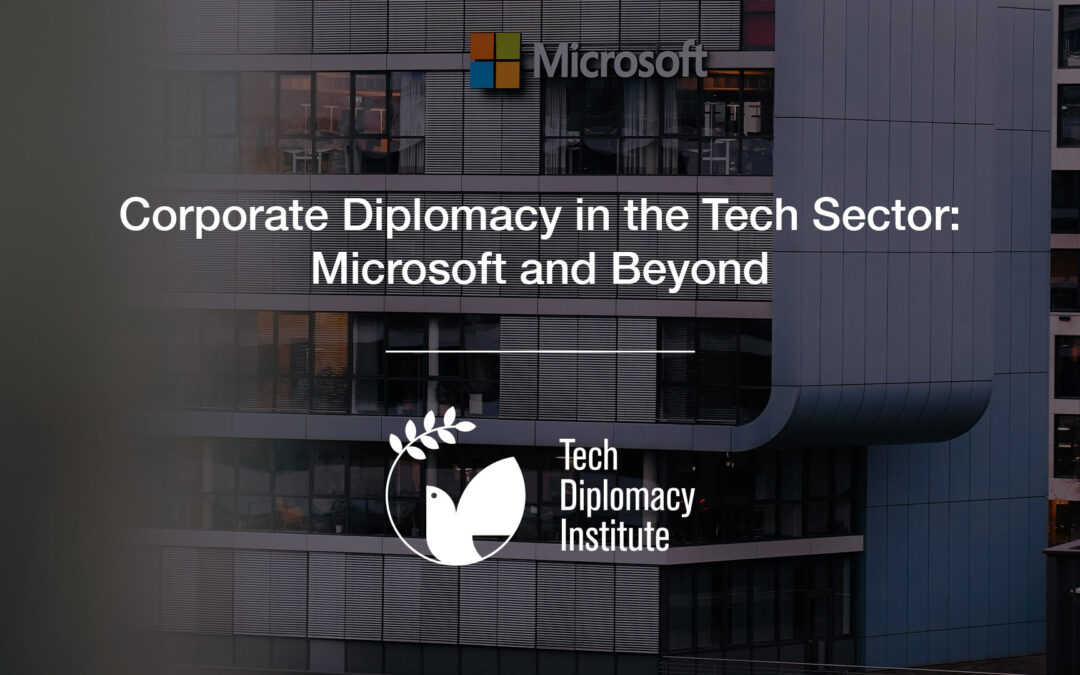The acceleration of tech diplomacy as a core governmental practice is mirrored by the evolution of corporate diplomatic functions within major technology companies, marking a transformative shift in how both governments and private entities approach global technology issues. Technology corporations are no longer passive actors but have established advanced government affairs, public policy, and international relations departments that perform quasi-diplomatic roles. These teams engage governments, international organizations, and civil society, shaping regulatory environments and governance frameworks that impact both business interests and public technology policy outcomes.
Among these companies, Microsoft stands out for its pioneering leadership in “digital diplomacy,” an approach championed by President and Vice Chair Brad Smith. This strategic paradigm fuses corporate advocacy with principled policy leadership on cybersecurity, data governance, and artificial intelligence ethics—redefining expectations for technology sector engagement at the crossroads of public and private governance. Comprehending the reciprocal influence between private sector diplomacy and state-sponsored tech diplomacy is essential for global technology governance and understanding the increasingly complex web of stakeholder interactions in shaping the digital future.
Microsoft’s Leadership: Brad Smith and Tech Diplomacy
Microsoft’s diplomatic strategy, executed principally through Brad Smith, is perhaps the sector’s most comprehensive engagement model. Smith, who has led Microsoft’s diplomatic transformation since 2015, shifted the company’s approach from traditional lobbying to purposeful “tech diplomacy.” This model centers on proactive engagement with issues extending far beyond immediate commercial interests, including cybersecurity, privacy, AI ethics, and digital sovereignty.
Smith’s perspective—as articulated in “Tools and Weapons: The Promise and the Peril of the Digital Age”—stresses that technology companies hold responsibilities extending to the social and ethical consequences of their innovations. This philosophy materializes in landmark initiatives: advocacy for robust privacy legislation, the establishment of international cyber norms protecting civilian infrastructure, and trailblazing efforts in AI ethics and transparency.
Notably, Microsoft’s diplomatic engagements are embedded in operational practice. The company implements rigorous AI ethics reviews, publicly releases government data request transparency reports, and maintains principled protocols for government content removal and data demands. These actions demonstrate that corporate diplomacy is not mere advocacy but includes substantive adjustments to business practice to align with global governance principles.
Microsoft’s diplomatic role is especially scrutinized in geopolitical contexts—navigating authoritarian landscapes, responding to nation-state cyberattacks, and shaping the norms of international security. Smith’s active participation in global forums and direct engagement with foreign governments are emblematic of the increasingly diplomatic functions technology leaders now perform, blurring the lines between industry and statecraft.
Sector-Wide Approaches: Google, Meta, Apple, Amazon, and China’s Champions
While Microsoft sets the benchmark, other major companies have likewise institutionalized sophisticated government relations and policy engagement strategies with distinctly diplomatic characteristics. Google commands an expansive global affairs network, confronting regulatory challenges across antitrust, content moderation, and AI governance. Its navigation of divergent government regulatory models epitomizes the need for adept diplomatic skills balancing corporate objectives with societal expectations.
Meta, through innovations like the Oversight Board, pursues accountability and legitimacy in content moderation—addressing complex controversies around misinformation, privacy, and democratic influence. Their diplomatic challenges often involve extensive engagement with governments and civil society to reform platform governance.
Apple’s approach prioritizes privacy and user security, resulting in principled—and sometimes contentious—interactions with governments over encryption and data access. Its diplomatic posture balances value-driven advocacy against market realities, offering a model for navigating regulatory friction. Amazon’s focus lies in cloud computing, data localization, and digital infrastructure for governments, reflecting the critical role of tech providers in the contemporary public sector.
Chinese technology firms such as Huawei, Alibaba, and Tencent exhibit markedly different diplomatic frameworks, shaped by close alignment with national interests. Huawei’s extensive government relations are geared towards security assurance in global 5G deployment—a domain fraught with national strategic complexity. These companies’ activities highlight how diplomacy in the sector varies profoundly by political context.
Organizing Corporate Diplomacy: Public Policy & Government Affairs
The corporate diplomatic model is closely linked to creation of specialized organizational units comprising experts from government, law, international relations, and policy analysis—often drawing on former officials to infuse diplomatic capability into corporate structures. This “revolving door” between public sector and tech companies facilitates high-level engagement but also raises concerns over potential regulatory capture and conflicts of interest.
Public policy and government affairs roles encompass regulatory monitoring, advocacy, participation in multistakeholder standard setting, and strategic responses to government inquiries. These operations increasingly resemble the formal functions of diplomacy—negotiation, coalition-building, and strategic communications—demonstrating corporate interests’ symbiosis with broader public and regulatory objectives. Larger tech firms maintain extensive, regionally specialized affairs teams, while smaller entities often leverage external specialists or associations for public policy capabilities.
Corporate Social Responsibility and Geopolitical Engagement
Corporate diplomatic engagement now extends markedly beyond narrow advocacy to encompass broader responsibility—addressing humanitarian emergencies, climate change, digital equity, and democratic resilience. Societal expectations press technology firms to adopt visible, constructive positions on global issues, linking their legitimacy to public interest action.
Recent geopolitical crises—such as Russia’s invasion of Ukraine—exemplify how technology firm decisions (around service provision, content moderation, cybersecurity) carry geopolitical ramifications and entail diplomatic negotiation with nations. Similar patterns are visible in other conflict and repression zones.
Tech companies increasingly collaborate with governments, international organizations, and civil society to advance public goods: digital literacy, cybersecurity capacity building, AI research, and innovation ecosystems. These cross-sector initiatives demonstrate the sector’s evolution from compliance-driven advocacy to proactive solution-oriented engagement for shared governance challenges.
Reciprocal Representation and Future Directions
The emergence of sophisticated corporate diplomatic capabilities heralds a new era of reciprocal governmental-private engagement—the “incipient forms of diplomatic representation” noted by scholars. As states create specialized tech diplomat posts, technology firms respond with dedicated government affairs functions, reshaping the interface between public and private authority in technology governance.
Looking ahead, trends indicate increased professionalization, deeper cross-company policy coordination, and expanding corporate responsibility commitments aligned with stakeholder values. Crucially, the advancing diplomatic roles of companies raise questions of regulatory oversight, democratic accountability, and the limits of corporate influence in global governance structures. The central challenge remains to harness private capability for the public good, without compromising democratic principles or enabling unchecked corporate power.
Conclusion
Corporate diplomacy in technology stands as a pivotal counterpart to governmental tech diplomacy, shaping the architecture of digital governance in profound ways. Microsoft’s leadership provides a template for responsible engagement that others are adapting, as the sector institutionalizes government affairs and public policy roles at unprecedented scale. The continuing evolution of these relationships deserves close scrutiny, particularly as technology’s influence on society and governance grows. Properly balancing corporate diplomatic power with accountability and democratic values will ultimately determine whether technological advancements support inclusive prosperity and public benefit or contribute to new governance risks.
References
Garcia, E. V. (2024). A global south view of tech diplomacy. International Affairs Review, 12(3), 45-68.
Guha, K. (2023). Corporate diplomacy in the digital age: New models for business-government engagement. Journal of International Business Policy, 6(4), 445-462.
Microsoft. (2024). Digital diplomacy and corporate responsibility: Microsoft’s approach to global engagement. Microsoft Corporate Affairs.
Smith, B., & Browne, C. A. (2019). Tools and weapons: The promise and the peril of the digital age. Penguin Press.
Tech Monitor. (2023). Tech ambassadors: Redefining diplomacy for the digital era. Tech Monitor Global Intelligence, 15(8), 23-29.
Tech Diplomacy Network. (2025). Tech diplomacy: Actors, trends, and controversies. Diplo Foundation Research Report.

